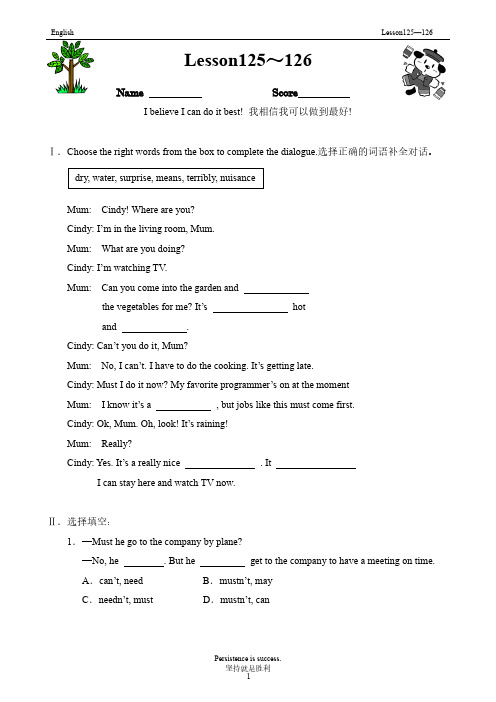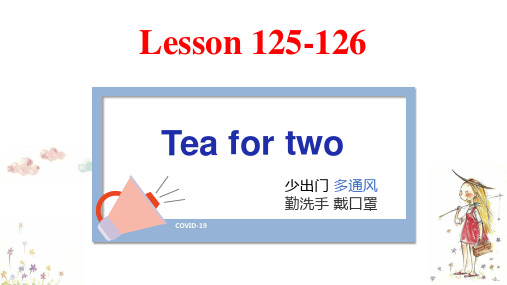新概念英语第一册Lesson125-126笔记(语法点+配套练习+答案)
新概念英语第一册lesson125-126

He had to look after his sister yesterday.
have to有人称、数、时态的变化,而must 只有一种形式。但must 可用于间接引 语中表示过去的必要或义务。
You don’t have to tell him about it. 你不一定要把此事告诉他。
(has to; doesn't have to/needn't)
My brother was very ill, so I had to call the doctor in the middle of
the night. 我弟弟病得很厉害,我只得半夜里把医 生请来。(客观上需要做这件事) He said that they must work hard. 他说他们必须努力工作。(主观上要做
She'll have tea by herself. 7.Why has Peter come in so soon? Because it is raining,so he doesn't need to
water the garden now. 8.What's the "pleasant surprise" for Peter?
Can you tell us your story ,Tony ? Tony,你能给我们讲讲你的故事吗? could表示有礼貌的请求,语气委婉,
常用于非熟人之间或晚辈对长辈,下级 对上级的场合。
--- Could I have the television on? --- Yes, you can. / No, you can’t. 提出委婉的请求在回答中不可用could。
新概念英语第一册Lesson-125-126

新概念英语第一册L e s s o n-125-126 -CAL-FENGHAI.-(YICAI)-Company One1Lesson 125-1261. Can’t you come in and have tea now, Peter?否定疑问句可以表示说话者惊讶、责难的口吻或赞扬,也可以表示说话者某种建议、邀请、请求或者看法2. Not yet. I must water the garden first. Not yet. 用于否定句中,表示还。
3. Do you have to water it now have to 不得不Do I have to wait for him Yes, I do. / No, you don’t (have to)Must I see him now Yes, you must. / No, you need’t.4. I’m afraid I must, Look at it! It’s terribly dry.I’m afraid 后面跟从句做宾语,翻译为:恐怕。
5. That was quick! Have you finished alreadyalready 已经经常与完成时态连用,用于肯定句,yet 用于否定句和疑问句Has your brother finished middle school No, not yet. / Yes, he has already finished.6. Yes. Look out of the window. look out of 从……往外看7. It’s raining! That means you don’t need to water the garden.① mean 意味着,意思是说 That means I can never see him again② need to do 需要做某事I’m so thirsty that I need to drink a lot of water.③ don’t need to = don’t have to = needn’t to④ It’s raining heavily! It rains cats and dogs. 倾盆大雨。
新概念英语第一册第125-126课重点语法

新概念英语第一册第125-126课重点语法一、第125-126课的重要句型或语法内容1、情态动词本课侧重的是情态动词must和need的用法,同时对比了have to的用法。
其中,需要注意的是must与have to的区别以及must的否定表达。
如:1)Do you have to water it now? I'm afraid I must.问句采用have to,强调的是客观上是否不得不,而回答时采用must,强调是自己主观认为必须。
2)That means you don't need to water the garden.句中的don't need to用作must的否定表达。
二、课文主要语言点Can't you come in and have tea now, Peter?Not yet. I must water the garden first.1)Can't you...?,反问句,往往用来提出建议或质疑。
2)not yet,还没有、还没好 3)water the garden,给花园浇水。
water在此用作动词,表示浇水的意思,如water the flowers,浇花。
Do you have to water it now? I'm afraid I must. 注意have to与must的区别:have to强调是出于客观原因“不得不”做某事,而must则偏重的是主观上认为“必须”。
另外,have to不是情态动词,就是一般的动词短语,之所以会放到情态动词里一起讲解,仅仅因为它能够表“必须”。
Look at it! It's terribly dry. terribly是terrible(可怕的)的副词,但在此处相当于very,表示非常、很。
What a nuisance! 1)nuisance,讨厌的东西或人。
新概念1Lesson 125-126

I have to go home now.
I don't have to go home now.
Grammar
一般疑问句?
I must go home now.
→Must you go home now?
I have to go home now.
→ Do you have to go home now.
→Yes, I must. →No, I needn't / don't have to.
→Yes, I do. →No, I don't .
Grammar
Grammar
Homework
1. 完成笔记 2. 练习册 3. 背诵课文
See you next time
C
Vocabulary
water
①n. 水
Give me a glass of water.
② v. 给…浇水
He is watering the flowers in the garden.
milk
dry
① adj. 干燥的 (反: wet)
② v. 把...弄干 I dried my hair with a towel. • dry one's eyes
Language points
Susan:Can't you come in and have tea now, Peter? Peter:Not yet. I must water the garden first. Susan:Do you have to water it now? Peter:I'm afraid I must. Look at it. It's terribly dry. Susan:What a nuisance! Peter:Last summer it was very dry,too.
新概念英语一册知识点与练习Lesson125~126

Lesson125~126Name ScoreI believe I can do it best! 我相信我可以做到最好!Ⅰ.Choose the right words from the box to complete the dialogue.选择正确的词语补全对话。
Cindy: I’m in the living room, Mum.Mum: What are you doing?Cindy: I’m watching TV.Mum: Can you come into the garden andthe vegetables for me? It’s hotand .Cindy: Can’t you do it, Mum?Mum: No, I can’t. I have to do the cooking. It’s getting late.Cindy: Must I do it now? My favorite programmer’s on at the momentMum: I know it’s a , but jobs like this must come first.Cindy: Ok, Mum. Oh, look! It’s raining!Mum: Really?Cindy: Yes. It’s a really nice . ItI can stay here and watch TV now.Ⅱ.选择填空:1.—Must he go to the company by plane?—No, he . But he get to the company to have a meeting on time.A.can’t, need B.mustn’t, mayC.needn’t, must D.mustn’t, can2.—A: we attend the party?—B: No, you needn’t, You are free.A.Must B.Can C.May D.Shall 3.—A: Must they work there all day?—B: Yes, they .A.need B.can C.may D.must 4.—A: Must I fill in the form in ink?—B: No, you .But you fill in the form carefullyA.mustn’t, can B.needn’t, mustC.can’t, must D.may not, must5.—A: Must we wait here till the teacher arrives?—B: No, you .A.mustn’t B.needn’t C.can’t D.don’tⅢ.改错:1.I haven’t to go there. I can make a phone call.2.You didn’t needn’t write such a note.3.A: Must I finish the home work before the class is over?B: No, you mustn’t.4.Have we to show the ticket when we enter the gate?5.Members must not to bring more than two guests in to the club.Ⅳ.中英互译Mean person watermelonby all means 讨厌的东西/人干燥的,干的surprise立即地我自己【名言警句-文化篇】A great poem is a fountain forever overflowing with the waters of wisdom and delight (P.B.Shelley, British poet)伟大的诗篇即是永远喷出智慧和欢欣之水的喷泉。
新概念英语第一册 Lesson125-126(25张)

Key Words
5.mean (meant ; meant) ⑴v. 意思是 eg:The red light means “stop”. mean to do sth 打算做... eg:I mean to go tomorrow. mean doing 意味着 eg:The picture means stopping. ⑵adj. 吝啬的 eg:He is mean about money. ⑶adj.卑鄙的 It is mean of sb to do sth 某人做...真卑鄙
Homework
COVID-19
少出门 多通风 勤洗手 戴口罩
Hale Waihona Puke 1. To finish the exercises after the text. 2. To practise the structures learned during the class.
Thank you! See you next time!
had to water it every day. SUSAN:Well, I'll have tea by myself. SUSAN:That was quick! Have you finished already? PETER:Yes. Look out of the window. SUSAN:It's raining! That means you don't need to water the garden. PETER:That was a pleasant surprise. It means I can have tea, instead.
Exercise
请将下列句子变为否定句和一般疑问句,并作否定回答 Lily must go home before nine o’clock. 否定句:L__il_y_m__u_s_t_n_’t__g_o_h_o_m__e_b_e_f_o_r_e_n_i_n_e_o_’_c_lock. 一般疑问句:_M__u_s_t _L_i_ly__g_o_h_o_m__e_b_e_f_o_r_e_n_i_n_e_o_’_clock? 否定回答:_N__o_,_s_h_e_n_e_e_d_n_’_t_. __
新概念1第125-126课

★water
vt. 供以水;给…浇水 My grandpa is watering the flowers in the garden.
n. 水;海水;雨水;海域,大片的水 Give me a glass of water. by water = by ship =by sea 用船运 Postmen send the packages by water. spend money like water My sister spends her money like water.
I must work hard. 我必须努力工作。(我觉得有必要这么做。) I had to go home by ship last night.我昨晚不得不乘船回家。 (有可能没有赶上其他的航班或者火车,没选择才坐船。)
can与could
could与can都是情态动词,could是can的过去式。二者都可用于表示请求, 但是用法稍有不 同。
这个杯子能保持糖的干燥。
他用毛巾擦干头发。 擦干眼泪
冬天衣服不容易干。
★nuisance
n. 讨厌的东西或人 What a nuisance! 真讨厌! You are a real nuisance to me.
你真是太讨厌了!
make a nuisance of oneself = make oneself a nuisance 惹人讨厌
否定疑问句的回答不受否定形式的影响,回答时只根据事实,是事实就用yes, 不是事实则为No.但 在翻译时要注意yes和no的译法。
--Won't you come with me? 你不跟我来么? --Yes, I will. 不,我要跟你去的。
新概念英语第一册课后题及答案:Lesson125-126

新概念英语第一册课后题及答案:Lesson125-126 Written exercises 书面练习A Write questions and answers.抄写以下句子,然后提问并写出相对应的否定句。
Examples:You have to leave early.Do you have to leave early?You don't have to leave early.She must leave early.Must she leave early?She needn't leave early.1 She has to decide immediately.2 She must decide immediately.3 We have to take a taxi.4 We must take a taxi.B Answer these questions.用have to或has to回答问题。
Example:I must go now. What about you?I have to go, too.1 I must telephone him. What about you?2 I must wait for him. What about Mary?3 I must meet her. What about Jim?4 I must travel by ship. What about Tom and Mary?C Write questions.模仿例句改写提问。
Example:I must go now.Do you really have to go now?1 I must telephone him.2 Mary must wait for him.3 Jim must meet her.4 Tom and Mary must travel by ship.答案:Lesson126A1 Does she have to decide immediately? She doesn't haveto decide immediately.2 Must she decide immediately? She needn't decide immediately.3 Do we have to take a taxi? We don't have to take a taxi.4 Must we take a taxi? We needn't take a taxi.B1 I have to telephone him, too.2 Mary has to wait for him, too.3 Jim has to meet her, too.4 Tom and Mary have to travel by ship, too.C1 Do you really have to telephone him?2 Does Mary really have to wait for him?3 Does Jim really have to meet her?4 Do Tom and Mary really have to travel by ship?。
新概念英语第一册:125-126课 语法及单词解析

新概念英语第一册:125-126课语法及单词解析【篇一】语法 Grammar in usemust, have to和 needn't这3个词都表示必要性。
在前面已对 must和 have to介绍过。
must是情态助动词,而have to是普通动词,二者在肯定句中一般可以互换,表示不可逃避的义务或责任。
must更带有说话人的主观色彩,而have to则更强调客观要求和外界影响。
must一般只能表达现在的必要性,而have to则可以表达过去或将来的必要性。
对比例句:Must you go now?你必须现在就走吗?Yes,I have to leave at once.是的,我不得不马上就走。
Yes,1 must leave at once.是的,我必须马上就走。
I shall have to leave London tomorrow.我明早得离开伦敦。
I had to stop smoking because it was forbidden in my company.因为我所在的公司内禁止抽烟,所以我不得不停止了吸烟。
如果我们用 must来提问,则只能用needn't来表达否定的回答。
needn't 还可以理解为have to的否定回答。
needn't (don't need to)和 don't have to都表示不必要;而 mustn't却表示绝对禁止,在说话人看来根本没有选择余地。
请看例句:Must she leave early?她必须早走吗?She needn’t leave early.她不必早走。
Do you have to take a taxi?你必须乘出租汽车吗?I don’t have to/need to take a taxi.我不必乘出租车。
You mustn't turn left.你不能左转弯。
Lesson 125-126课后小结

e.g.Ihaveto leave now. / I must leave now.
I had to do my homework last night./ He has to study.
如果用must来提问,只能用needn’t来表示否定回答;needn’t还可以作为haveto的否定回答;
5.Thatmeansyou don’t need to water the garden.
省略了that的宾语从句
Grammar:must, have to和needn’t
must和haveto都表示“有必要,必须”;must带有说话人的主观看法,haveto还有“不得不”的意思,更强调客观原因和需要;
New Concept English Ⅰ
54/65
Lesson125-126
Sept14, 2018
1.waterv.浇水
waterthe plants给植物浇水
n.水spenຫໍສະໝຸດ money like water花钱如流水
2.dry adj.干的,干燥的
e.g. The weather is hot and dry.
e.g. You mustn’t walk on the grass.(表示禁止)
Homework:
1.完成练习册P171-A;默写单词和句子;
2.完成补充练习及爱乐奇线上作业;
3.背诵Lesson 125,下周四前将背诵的语音发至班级群。
Toone’s surprise让某人惊奇的是
e.g. Tomy surprise, he is a millionaire.
新概念英语第一册_第125-126课新

Grammars
have to 与must
must 表示主观的认为有必要,有义务 have to 表示含有客观的环境方面的需要, 除了“必须”之外,还有“不得不”。 must 没有时态和人称的变化 I must ,he must have to 有时态和人称的变化 I have to, he has to eg. I must work hard. 我必须努力工作。 (我觉得有必要这么做。) I had to go home by ship last night. 我昨晚不得不乘船回家。 (有可能没有赶上其他的航班或者火车,没选择 才坐船。)
LOGO
Key points
6. I had to water it every day. 7. Well, I‟ll have tea by myself. 从…往外看 8. look out of the window. 9.That means you don‟t need to water the garden. don‟t have to needn‟t 表示“不必”,是 must和 have to的一般现在时否定式。 10. That was a pleasant surprise. 真是意想不到的好事。
Must I arrive on time? -Yes, you must. -No, you needn't. Do I have to arrive on time? -Yes, you have to. -No, you don't have/need to.
Must I take care of my grandma? Yes, you ____./No, you ______. (must; needn't) Does she have to come home before 7? Yes, she _____./No, she __________. (has to; doesn't have to/needn't)
新概念英语第一册第125-126课

Can you tell us your story ,Tony ? Tony,你能给我们讲讲你的故事吗? could表示有礼貌的请求,语气委婉,
常用于非熟人之间或晚辈对长辈,下级 对上级的场合。
--- Could I have the television on? --- Yes, you can. / No, you can’t. 提出委婉的请求在回答中不可用could。 He couldn’t be a bad man.
1. -C_o_u_l_d_ you come and play with us now?
- I’m afraid I _c_a_n_’_t . I _m_u_s_t_ do the cooking. I _ca_n__ come later.
2. - _M__u_st_ we clean the windows today? - No, you _n_ee_d_n_’_t _. You _ca_n__ clean them tomorrow.
LOGO
Key words&expressions
water ['wɔ:tə, 'wɔ-] v. 浇水
Terribly ['terəbli]
adv. 非常
dry [drai]
adj. 干燥的,干的
Nuisance ['nju:səns] n. 讨厌的东西或人
mean [mi:n]
喜欢吃甜食。
It’s not my cup of tea. 我不喜欢,不感兴趣。
LOGO
Can Peter come in and have tea?
- 1、下载文档前请自行甄别文档内容的完整性,平台不提供额外的编辑、内容补充、找答案等附加服务。
- 2、"仅部分预览"的文档,不可在线预览部分如存在完整性等问题,可反馈申请退款(可完整预览的文档不适用该条件!)。
- 3、如文档侵犯您的权益,请联系客服反馈,我们会尽快为您处理(人工客服工作时间:9:00-18:30)。
I'mterriblysorry.我非常抱歉。
I’ve got aterribletoothache.我得了要命的牙疼。
dry
1.adj.干燥的
反义词:wet
2.v.使...变干
It is alwaysdryinfall.秋天天气干燥。
2. ____ bright girlsthey are!
A. WhatB. What a C. How D. How a
3. ____ interestingthe film is!
A. What B. What anC. HowD. How a
4. ____ sunny day! Let’s go out for a walk.
这个单词是什么意思?
The red lightmeans stop.红灯意味着停止。
Imean to traveltomorrow.
我打算明天去旅行。
surprise 1. n.意外的事,吃惊
to one’s surprise令某人吃惊的是
2.v.令人吃惊
surprising adj.令人吃惊的(物)
surprised adj.感到吃惊的(人)
be surprised at sth.对…感到惊讶
To my surprise, she is the mother of two children.
令我惊讶的是,她竟然是两个孩子的妈妈。
Youalways surpriseme.你经常让我惊喜。
This is such asurprisingthing.
我爷爷正在花园里浇花。
一杯水a glass of water
一滴水a drop of water
Postmendeliverthe packagesby water.
邮递员用船运送包裹。
terribly adv.很,非常
=very=too
terribleadj.糟糕的,可怕的
It isterriblyhot.天真热。
be afraidof sth.害怕某事
I’m afraidthat Tom won’t come today.
我恐怕Tom今天不会来了。
Sam is afraidto make friends.
Sam害怕交朋友。
Amy is afraidof snakes.
Amy害怕蛇。
感叹句
What + a\an + n. (单数)+(主+谓)!
This glass cankeep the sugar dry.
这个玻璃瓶可以让白糖保持干燥。
dry one’stears擦干眼泪
Hedriedhis hairwitha towelafter hehad hada shower.
nuisance n.讨厌的人或物
What a nuisance!真讨厌!
1.must意为必须,情态动词,后跟动词原形,无数和人称的变化
1)As a student, wemuststudy hard.
2)Imustgo now.
3)The girl is a runner. Shemustrun for an hour every day.
mustn’t意为禁止,为must的否定式
You are a realnuisance tome.你真讨厌。
make oneself a nuisance(让自己)惹人讨厌
Don’tmake yourself a nuisance.
不要做一个令人讨厌的人。
mean vt.意味着,意思是
meanto dosth.打算做某事
Whatdoesthis wordmean?
Lesson 125 Tea for two
1、单词分类
v.
adv.
adj.
n.
water
mean
nuisance
2、课文复习
三、课文重点
重点
练习
water
1.vt.浇水
2.n.水
by water水运,乘船
= byship=byboat
My grandpais wateringthe flowers in the garden.
instead adv.代替
放在句尾
insteadofsb. / sth.代替某人或某物
If there is no chicken, I willeat beef,instead.
如果没有鸡肉的话,我就吃牛肉代替吧。
Tom代替我画了一张画。
Tom drew a pictureinsteadofme.
come in
进来
have to do sth.
不得不做某事
have tea
喝茶
by oneself
自己一个人
water the garden
给花园浇水
look out of the window
向窗外看
What a nuisance!
真讨厌!
don’t need to do sth.
不需要做某事
3、语法解析
I am reallysurprised.
The teacher issurprised ather answer.
老师对她的回答感到惊讶。
immediately adv.立刻,马上
I have togo immediately.
我得马上走。
be afraid that+宾语从句恐怕…
be afraidto do sth.害怕做某事
1)Wemustn’tspeak loudly in class.
2)Youmustn’tpark here.
3)Studentsmustn’tplay computer games too often.
needn’t意为不需要,must疑问句的否定回答
A. How a B. HowC. What aD. What
5. ____ hard workit is!
A. HowB. WhatC. What a D. What an
by oneself独自一人
I’m afraid that I have totravel by myself.
我恐怕我得自己去旅行了。
What + n.(复数/不可数)+(主+谓)!
How +形容词/副词+(主+谓)!
多美的花园啊!
Whata beautiful gardenit is!
Howbeautifulthe garden is!
1. ____ a e watchit is!
A. HowB. WhatC. What a D. How a
